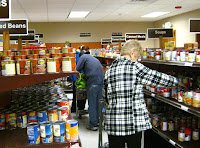
After working for decades and raising four children without government assistance, Carol found herself asking for help feeding herself and her husband, Richard. Faced with health problems that prevent them from working, Carol and Richard struggle to get by on their monthly Social Security check. And like millions of seniors today, by the time they pay their bills, they often find themselves with little or no money left for groceries.
A recent report by Senator Bernard Sanders, chairman of the U.S. Senate Subcommittee on Primary Health and Aging, reveals that 5 million seniors in the U.S. face the threat of hunger, 3 million are at risk and nearly 1 million seniors do go hungry due to financial constraints. The report also indicates that seniors ages 60 to 69 have the highest risk of going hungry and that the sharpest growth in hunger is among seniors and veterans whose income is above the poverty line, or are living alone, disabled, divorced, unemployed, younger than 70, and those with resident grandchildren. In addition, when it comes to veterans, 25% of military families – 620,000 households – need help putting food on the table, according to another study by Feeding America, a network of 200 food banks.
The Lorton Community Action Center (LCAC), a food bank in Fairfax county that my family lives near, and that my family and our firm help support financially, recently made national news in a U.S. News story entitled, “Hunger in America: 1 in 7 rely on food banks.” LCAC is one of many food banks in Fairfax and Fredericksburg that help to prevent hunger in seniors, veterans, and other local citizens by collecting and distributing food. LCAC alone distributes 8 tons of food every month and helps to feed 220+ families weekly.
Hunger and Malnourishment in Seniors and Veterans
Hunger and malnourishment in the senior population can lead to health problems, including fatigue, loss of muscle strength, depression, memory loss, impaired immune response, anemia, infection and, without nutritional intervention, death. For seniors especially, it is important that meals are packed with the following essential vitamins and nutrients:
- Folic acid helps to decrease the buildup of homocysteine, which can put seniors at risk for heart disease and other chronic illnesses. It is also essential for proper red blood cell production. Foods high in folic acid include: spinach, asparagus, lentils and many fortified breakfast cereals.
- B12 helps our bodies synthesize protein and aids in mental function. Recommended foods are: turkey, chicken, beef, eggs, milk, baked salmon, clams, mussels and crab.
- The body’s need for vitamin C increases with age. Seniors should incorporate at least five servings of fruits and vegetables a day. Strawberries, oranges, grapefruit, tomatoes, broccoli, red bell pepper and potatoes are all rich in vitamin C.
- As we age, vitamin D can’t synthesize in the skin as quickly, but fortunately levels can be boosted by eating foods such as oatmeal, fortified cereal, egg yolk, salmon, sardines or mackerel, cow’s milk or soy milk and orange juice fortified with vitamin D.
- Fatty acids play a central role in reducing inflammation in the body. The best source is fish, which should be consumed at least two times a week. Flax seeds are also rich in essential fatty acids and can be sprinkled on to a number of dishes, including salads, cereals and smoothies.
- Last but not least, seniors need to stay hydrated and should generally have at least eight 8-ounce glasses of fluid a day. Water is best.
Seeking Assistance
Asking for help is a brave step that experts say many seniors are reluctant to take. Sometimes it’s because of a perceived stigma against taking handouts; other times it’s because seniors aren’t aware they qualify for assistance. However, if you or a loved one needs assistance, you are not alone. In fact, over 46 million people, or one in seven citizens, utilize food banks across our nation. There are more surprising facts about our neighbors in need. Linda Patterson, executive director of Lorton Community Action Center, says stereotypes of the people who need food assistance are misleading. “The people who come here are hard workers. They are employed. They are the school bus drivers, the lab techs in doctor’s offices, receptionists, the janitors who clean the floor of your children’s school,” Patterson says. “They just can’t make ends meet because some kind of crisis has hit them.”
If your loved one’s cupboard is bare or contains old food, if they have experienced unusual amount of weight loss (or weight gain from eating the wrong type of foods), or if they have unnatural-looking and excessive bruises and wounds that take a long time heal, this can be a sign of a lack of proper food consumption. Therefore, it is especially important that these, and other seniors and veterans, seek assistance if they cannot afford healthy food.
What if, like Carol and Richard in our example above, you are living on social security alone and struggling to make ends meet, and you or a loved one becomes incapacitated or needs long-term care? Nursing homes in Northern Virginia cost $9,000-$12,000 a month, on average, and Medicaid eligibility rules are extremely complex and confusing, and impossible to understand without highly experienced legal assistance. If you don’t have an Incapacity Plan in place, If you have a loved one who is nearing the need for long-term care or already receiving long-term care, or if you are a veteran and want to learn more about veteran’s benefits, such as Veteran’s Aid and Attendance, now is the time to get started. Call us today at 703-691-1888 in Fairfax or 540-479-1435 in Fredericksburg to set up an appointment for an introductory consultation.














Leave a comment
You must be logged in to post a comment.